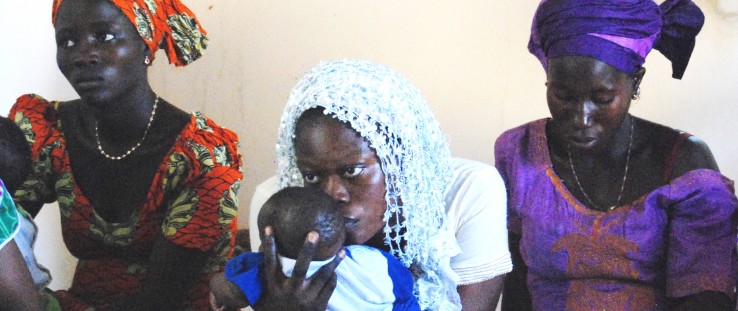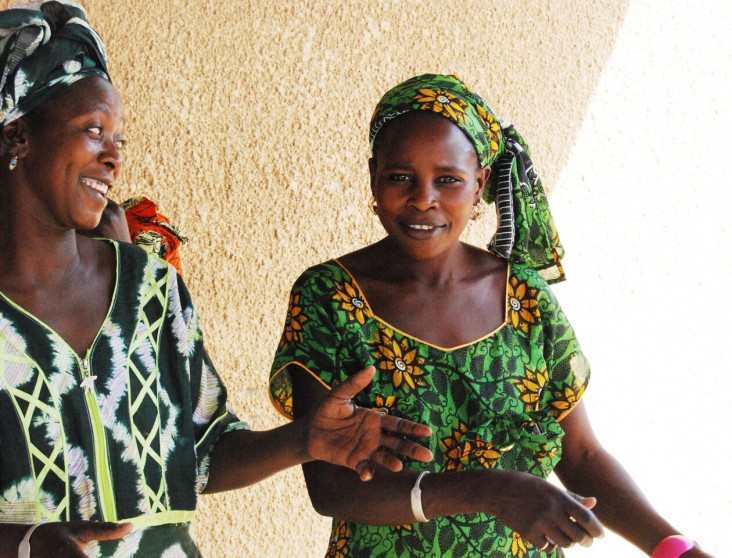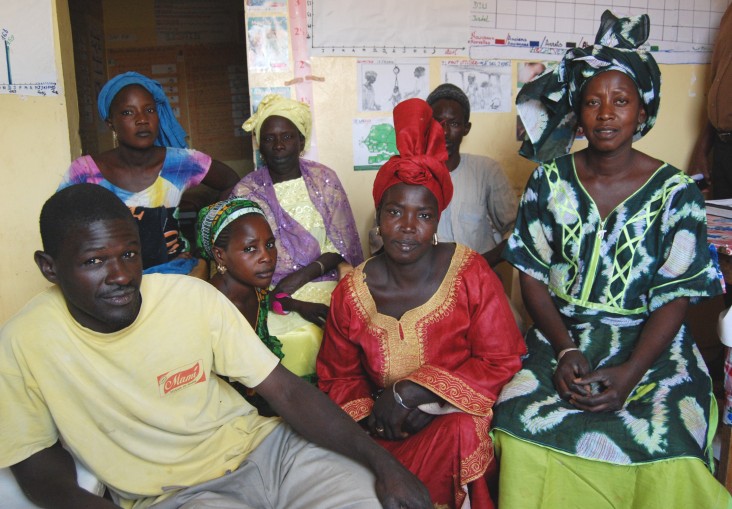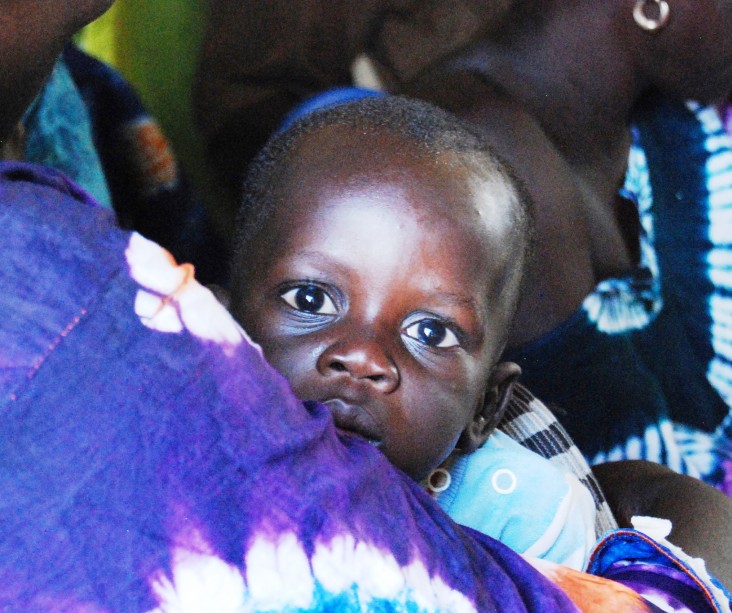 New mothers listen intently to guidance from the community health team in Koulouck Mbada about caring for their newborn infants.
Benjamin C. Bynum
New mothers listen intently to guidance from the community health team in Koulouck Mbada about caring for their newborn infants.
Benjamin C. Bynum
 New mothers listen intently to guidance from the community health team in Koulouck Mbada about caring for their newborn infants.
Benjamin C. Bynum
New mothers listen intently to guidance from the community health team in Koulouck Mbada about caring for their newborn infants.
Benjamin C. Bynum
Speeches Shim
Thirty kilometers from the nearest health center, in the middle of a dust-strewn landscape speckled with baobab trees, lies Koulouck Mbada, Senegal. A small village of not more than 50 households, Koulouck Mbada is a quiet place and a very poor one.
As local residents recount, “A family who has breakfast will struggle to find food at midday.” Affording medical care—and the costs of transport, ancillary medical supplies and time away from fields and household—is impossible for most.
Due to its poverty and inaccessibility, Koulouck Mbada is the site of one of Senegal’s community health huts, small concrete facilities staffed by trained but unpaid community health volunteers. These volunteers provide basic health services, including, if women are unable to make it to a formal health facility, labor and delivery care.
Fatou Diouf has been the volunteer community birth attendant in Koulouck Mbada for 20 years. Like most traditional health volunteers, she had no formal education before receiving training from USAID on safe birthing. Although short, Diouf is made taller and more imposing by her colorful head scarves, and her warm smile conveys both the joy and tragedy of her calling.
“As a birth attendant, I help bring new life into the world—but I simultaneously risk the worst that can happen, too,” Diouf said.
Even in the developed world, pregnancy remains a dangerous time in a woman’s life. In the United States, as many as 550 women die annually of pregnancy or labor-related causes.
In Senegal, this number triples: Almost 1,800 women will lose their lives every year while giving birth. The major cause of these deaths is massive, uncontrolled bleeding following delivery, a condition known as postpartum hemorrhage. In rural villages like Koulouck Mbada, stopping hemorrhage once it begins is nearly impossible.
“A large number of women still give birth in their huts,” Diouf said. “This practice is promoted by grandmothers and mothers-in-law; they suffered giving birth in this way and feel it proves a woman’s worth.”
When a woman starts hemorrhaging, however, Diouf says, “I cannot do anything except put her in a horse cart, send her to the facility and pray.” Even at the nearest health post, more than an hour away, there is no capacity to perform transfusions, no electricity and no midwife.
By contrast, in the United States—or in well-stocked health facilities with stable electricity—doctors routinely administer drugs like oxytocin, which can stop hemorrhaging and save women’s lives. Most of these drugs, however, require refrigeration and trained medical staff to be effective. Without them, women in poor countries often bleed to death as helpless family members and medical staff look on.
A Miraculous Medicine
From 2013 to 2014, the Government of Senegal’s Direction of Reproductive Health and Child Survival, supported by USAID and the Gynuity Health Project, launched a study to see whether they could bring these drugs to places like Koulouck Mbada.
Volunteers like Diouf were trained to administer one of two hemorrhage-preventing drugs: either oxytocin (the gold standard) in an easy-to-use injectable format or an alternative called misoprostol, which is much cheaper than oxytocin and does not require refrigeration.
By comparing communities receiving the two drugs, the study would assess whether uneducated community volunteers could reliably provide these drugs to women at risk of hemorrhage, and whether misoprostol, not formerly licensed in Senegal, was as effective as oxytocin and should be introduced nationwide.
Twenty-eight communities were selected for the study based on the commitment of their local health volunteers, the number of deliveries performed annually and their geographic inaccessibility.
Koulouck Mbada was targeted for the misoprostol arm of the study, and the results were miraculous: Within 15 months, the number of hemorrhage-related deaths plummeted.
Initially, three women in the area died in hemorrhage every month. During the study, only one of the 1,333 participants hemorrhaged, and she survived. The number of women giving birth in their homes dropped precipitously as well, with the majority opting to give birth in a health facility.
Both misoprostol and Diouf were a success.
It Takes a Village
These dramatic declines in maternal mortality were wrought not just by misoprostol or by Diouf, but rather “through the labor of an entire team” as the residents of Koulouck Mbada say.
It took the support of her relatives and other village women to allow Diouf the time away from her fields for a week of training in the use of misoprostol and an apprenticeship with a licensed midwife. To be away from her family and fields was a challenge, which Diouf frankly reports costs her money.
After training, a nurse at the local health post visited Diouf monthly to review what she had learned. Regular site visits were also performed by local, regional and national officials. In this way, Diouf said, she “didn’t feel abandoned. These visits said, ‘You are important. I have left my home to visit you and see what’s going on here. What you are doing matters.’”
Diouf was also supported by a community monitoring committee, which included the most important people in Koulouck Mbada: the chief, the local imam and the Christian catechist. Committee members helped identify pregnant women, recruit them for the study and support them during pregnancy.
“This was the labor of ants,” said Diouf, using a colloquialism from her native language. “Sometimes we must care more for the women than for ourselves,” as she traveled regularly between the compounds in the heat and battling the prejudice of religiously conservative family members skeptical of modern medicine.
This work, however, bore fruit. The conversations about maternal health sparked by the committee ultimately “built a community spirit aimed at reducing maternal mortality, where everyone in the community is involved,” Diouf said.
A Community of Believers
The community of Koulouck Mbada is full of women and babies who have benefited from the drug.
Ami Sene is one such beneficiary. After her first delivery, she “spent hours in the dark at night, crying with pain.” Weak from blood loss, she was dependent on her mother-in-law to nurse her back to health and care for the new baby. Her recent delivery with misoprostol was very different, however.
“As soon as I took the misoprostol, I felt well,” Sene said. “The placenta came out easily; my pain decreased.”
She was also back on her feet quickly, to her in-laws’ surprise. “I was able to dress myself and take the child for its first round of vaccinations on my own,” she said.
Relieved and astonished, Sene’s father-in-law declared that he would “give Fatou a bull in thanks, as this was surely a change for the better!”
Although Diouf is still waiting on her bull, she and her colleagues across the region have more than exceeded the study’s expectations.
“The volunteers are able to do a better job than many midwives, because they are positioned in the community, attentive to their patients, and are able to take their time and respond to their patients’ needs,” said district midwife Khady Sao.
Diouf, however, is not willing to take all the credit—she reiterates that the strength of this study and the power of its results “come from the team, from everyone caring for each other.”
“The support of this team, the supply of the drug and the training and support from the health district have been a blessing. My highest wish is to extend this treatment to other parts of the country. Our community shows how important it is,” she said.
And, indeed, scale-up is the next step.
The Government of Senegal concluded that, with appropriate training, volunteers could administer hemorrhage-preventing drugs. Officials also said that misoprostol should be licensed due to its equally strong results when compared to oxytocin and its superior heat stability—during the course of the study, almost 10 percent of the supplies of oxytocin had to be discarded due to temperature concerns.
Misoprostol has since been licensed, and work is underway to train more volunteers and sustain the community mobilization that made the study a success.
The community of Koulouck Mbada represents the future of maternal health in Senegal. In the years to come, thanks to the work of USAID—and, more importantly, Diouf and her fellow community members—Senegal hopes to change community norms, increase access to lifesaving pharmaceuticals and save the lives of hundreds of women and newborns.





Comment
Make a general inquiry or suggest an improvement.